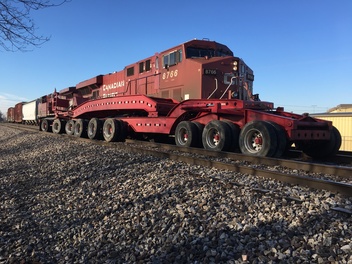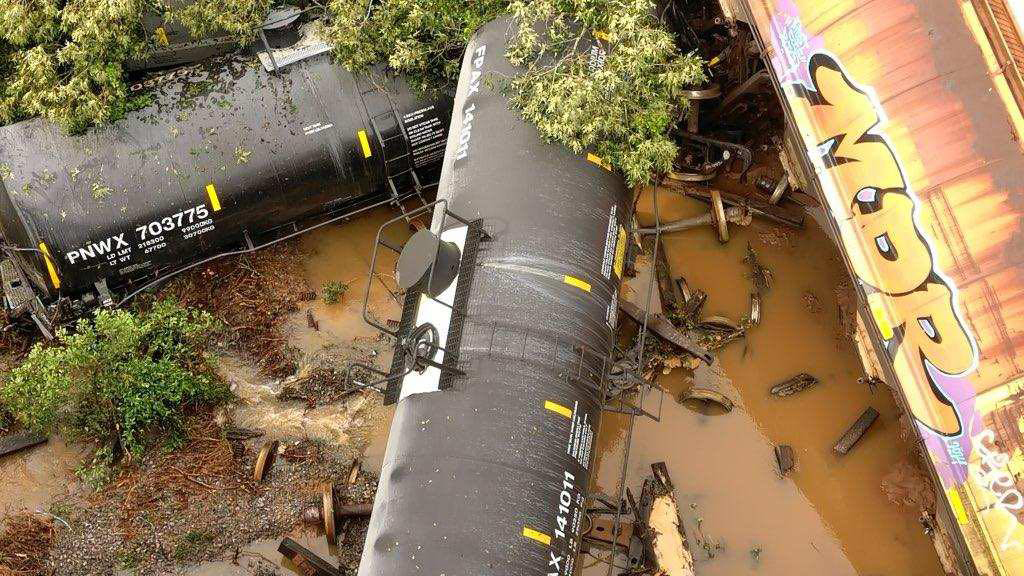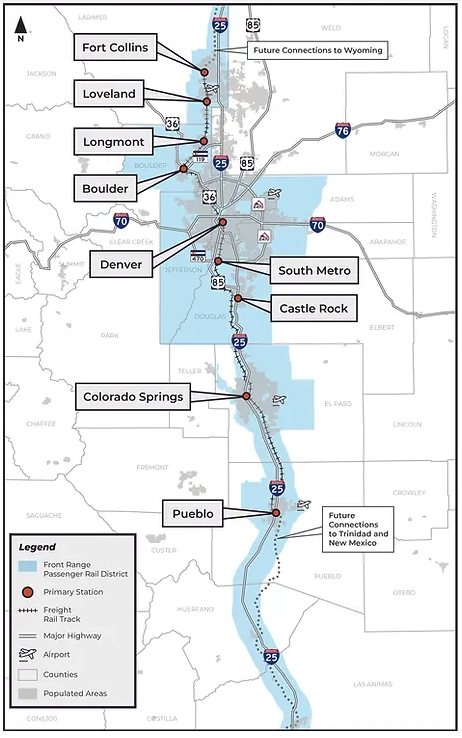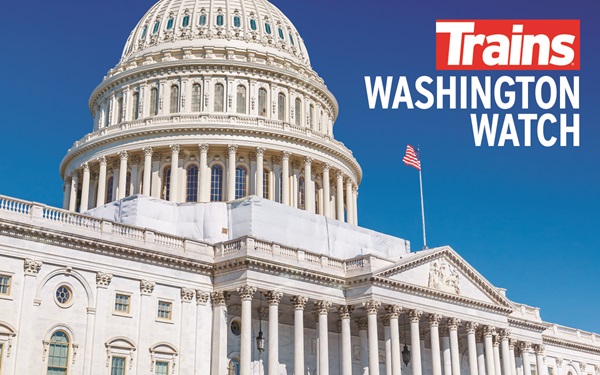The incident happened Wednesday morning at around 8:30 a.m. local time when a northbound freight train traveling to Windsor, Ontario, from Chicago struck an oversized load on a semi truck at a Norfolk Southern grade crossing in Butler.
Information released by the Indiana State Police says the truck and trailer combination, weighing in at 368,000 pounds and 194 feet in length, was halfway through the grade crossing when the crossing lights came on and the gates began to lower. Before the truck and trailer could clear the crossing, the northbound train struck the rear of the trailer.
The rear portion of the trailer separated from the remainder of the load and was pushed along the right-of-way by the train. The lead locomotives, a Canadian Pacific-painted GE locomotive, received damage from the collision, but no injuries were reported by the train crew or truck driver.
The incident remains under investigation by state and local agencies.
It was not immediately clear what type of load the semi truck was carrying.














Thanks for sharing Police investigate train collision with an oversized truck in Indiana, it’s a good article.
Well, it seems like the investigation should start within their own department. If they are escorting they should be contacting the RR to inform them of the date/time etc when they would reach the RR and even let them know when they were 5 minutes out so any potential trains could be notified. Trains very rarely leave their tracks to cause an accident with a vehicle, the vehicle almost always has to be in the trains way.
I was a signal maintainer back a few years. This crossing had gates and flashers. The total length of the truck and load was 194 feet. FRA rules states lights must start flashing a minimum of 20 seconds before the train reaches the crossing. Most class ones use 30 seconds. I can see a load that long under the right circumstances might not make it across in time. Railroad should have been notified ahead of time. Sure dispatchers are busy, but hitting a load like that and damaging the engine and the investigation that follows will be much more time consuming and expensive than that call to the railroad.
The very same thing happened on csx crossing near Rocky Mount, NC a few years ago. Highway Patrol was escorting low-boy trailer and it got stuck on crossing and no one notified CSX.
I will play devils advocate here. The majority of the comments say the railroad should be contacted before the load crosses the tracks. I don’t agree. This is a complicated accident that could have been avoided but at what costs or inconvenience. If the policy is to call the railroad every time they come to a crossing then these loads wouldn’t move. The dispatchers are already way overworked and cannot be expected to add more phone calls to the work load. I wouldn’t want one of these loads stopping in my town blocking travel for 20-30 min just to get approval from the railroad just to make a crossing that should only take a minute or less. Sometimes sh*t happens. That’s why there is insurance.
Indiana State Police escort all oversized loads now (not mobile homes) for liability reasons. Obviously, someone was supposed to contact the railroad but didn’t or it didn’t get to the train crew.
Totally ridiculous…an escorted transit load…how does this kind of crap happen???
Whoops! Who forgot to give the railroad’s telephone number to the ISP? Happy no one was hurt badly.
Well at least the Indiana State Police had an officer close by to start the investigation. I wonder if the escorting trooper will get to help with the investigation or will he just get to be part of the investigation.
Southside of the little town of New Holstein, Wisc. exists an unsignaled grade crossing with a warning sign depicting a semi getting hung up on it. Needless to say, they do not tarry, inspite of the fact that there no longer comes along a Chippewa Hi at 60 mph. Interesting to what high standard the Milw.Rd. line to Green Bay was built. Those chasing Soo #1003 on 23 Nov. will notice.
Seems that the best way to coordinate a move like this is to communicate. Obviously this did not occur. I’d due the State police. You’d think that if they were involved, they’d ensure that all parties concerned were informed.
Communication between local law enforcement and railroad DS has improved but still has a long way to go.
I still fail to understand why railroads are not informed of special movements that will block tracks in advance regardless who the escourt is to avoid accidents like this one that also places human life in jeopardy.
Before I read the comment by Mr. Miller, the terrible collision that unfolded in Midland, Texas, on Union Pacific also came to mind. UP had NOT been notified of the parade move but if memory serves me well got the blame from the Get Go. Tragically, several disabled Veterans (possibly war vets at that) were killed while riding on the flatbed behind the vehicle that had just cleared the crossing when the accident occured.
It takes much more than rules and regulations but God Given Common Sense as well and makes one think that this element is no longer wired to the human brain in the majority of people who are required to make decisions such as these who live in this Century 21 ultra-modern high tech age.
Operation Lifesaver continues to reach out to Americans and Canadians alike, but the lessons learned will only work and save lives when people put their brain in gear before taking on the responsiblity entrusted in them to practice Safety First when undertaking a task such as this one. Thankfully, this time no human life was lost. sadly, next time the people who are involved might not be as fortunate.
Actually, the truck had not cleared the crossing!
IINM, the rail line crosses US6 in a super-elevated curve. A large low-slung load like that would be twisting as it crossed over, so I would assume they did it very slowly to avoid an upset. They obviously did not expect a train or even looked for one.
The train in question (a CP train using trackage rights) was connecting from the ex NYC waterlevel route to the ex WAB Detroit-St.Louis main, so it would have been hard to tell it was going to use that crossing, even it they did look.
The tragic Midland, Texas, parade collision back in 2012 immediately comes to mind while reading this story. That procession also was being escorted by law enforcement. Fortunately, events like this are very rare because most heavy and specialized trucking companies either avoid railroad crossings OR contact the railroad to obtain the latest up-to-date train operations information. That was SOP in the Permian Basin oil fields, when huge refinery equipment or drilling rigs had to be moved. Nevertheless, this Indiana event is a Big Oops.
These collisions happen all too often. Heavy/oversized loads require route planning to avoid places they can’t fit through or bridges that can’t bear the weight. Identifying rail crossings would seem to be an obvious part of the process. Coordination with railroads to ensure safe passage seems common sense. Money alone should make this happen – a special load could end up blocked for an extended period if the railroad decided to stop a train over the crossing. You can bet the trucking company would find the railroad phone number fast if they came up to the crossing and found a train stopped across it.
The likelihood of this sort of collision has troubled me for a long time. Others like it have happened. I tend to lay responsibility upon the escorts, as it is their purpose to ensure the safe movement of these special equipment shipments whether they be loads or empties. Automatic grade crossing protection standards require a minimum twenty second activation prior to train arrival. In my opinion, if any escorted special equipment move would require 15 seconds (to provide a safety cushion) to traverse any railroad grade crossing, the railroad must be notified of the move and permission to cross secured.
Rest assure the carrier’s insurance company is going to be in the investigation. Long time ago I worked in a commercial insurance company that would underwrite mobile equipment moves and would spread the risk in access of a dollar limit to other companies, not cheap. Beside the damage to the equipment, we also have impact to the load which may or maynot be salvageable. All going to come back to the hauler in legal and higher insurance costs. Yap, this is going to be that plays out in the courts for years to come. Just glad no one was hurt.
Of course, the Indiana State Police were doing their usual good job.
Unfortunately, the lack of common sense is not a modern development. Those of us who study history can find poor judgement throughout the ages.